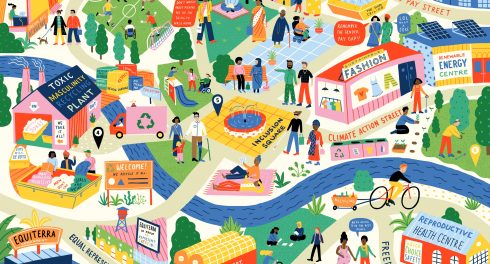Keep things simple and carry on learning

TAI members at the 2020 learning retreat
I remember navigating the role of my first monitoring and evaluation job (this was before the “L” for “Learning” earned a spot in the MEL acronym). The position was new to the organization, and I carried the simultaneous feelings of exhilaration – to take on a new perspective, to be frolicking in the fire hose of possibility and learning; and fear – of not knowing what exactly my role was, of not being able to meet demand, or worse yet, of being irrelevant.
This time of unprecedented, global crisis has resurfaced some of these same professional fears for me and others. Inspired by a recent conversation among the Strategic Learners Network hosted by Grantmakers for Effective Organizations, I reflected on the role of learning officers during this time of crisis. I pinpoint three key principles and practices that I and other learning officers might bring to the table not only to support ourselves and our colleagues, but also the efforts of our organizations, and the work of our partners.
- Individuals are the gears that make effective learning systems go.
In these times of deep uncertainty and distress, Vu Le extends a simple but powerful invitation for us to accept that “it’s ok to not be ok.” This is hard for many of us, particularly in a professional setting. And, as learning officers, we are often looked to for poise. We design and facilitate participatory processes to lead teams comprising diverse personalities and perspectives to address challenging questions. As Eugene Kim notes, one “role of a good collaboration practitioner is to guide others through freak-out moments. Another role is to manage these moments yourself.”
As learning officers, we can bring to bear our attention to the individual. This is because we are trained, formally and/or through on-the-job fails and wins, to be good listeners and sensitive to shifts in learning needs and contexts. We owe it to our colleagues and ourselves to promote and practice self-care in these trying times.
- Strong learning organizations respond and adapt to change.
Learning officers wage long-game campaigns to shift hearts, minds, budget allocations, and practice to develop and sustain organizational learning culture and systems. Strong learning organizations respond, adjust, and adapt to changes. And learning systems must also support and evolve in service of organizational change.
In the philanthropy sector, learning officers are well-versed in anticipated change with the promise of a strategy refresh often on the horizon. Sudden internal or external change can be exciting and hasten the adoption of learning initiatives. But disruption can also undermine nascent (or established) data collection and reflection practices, distract internal learning champions, and even marginalize certain voices from learning spaces.
As I prepare to update TAI’s own MEL system to meet our new strategy needs, I am finding it hard to focus. I am certainly grappling with “CAD: Corona Attention Deficit,” as Duncan Green has coined this emerging affliction. How to learn when everything feels upended? In my upcoming work with colleagues, I will draw on our existing organizational assets – both culture and practice – and reflect on what kind of learning strategy is most needed by and feasible for our organization. And I will try to balance between our short- and longer-term learning needs, drawing on this peak uncertainty planning matrix, as Dave Algoso suggests.
One of the informal progress markers I used to gauge my progress as a new MEL professional was being invited to (rather than casually crashing) design and decision-making meetings. Those of us fortunate enough to still have jobs are now grappling with how to facilitate or observe learning when we aren’t “in the room” with colleagues or partners. I’m drawing on the many and still emerging guides for how to work and learn online. We can also ask and name who isn’t in the virtual room, knowing that we ourselves cannot and will not be in every room.
- Systemic change is often transformational and always an opportunity for rich learning.
TAI facilitates and connects learning and action among institutions and people who are in the business of supporting equitable systems-level change. The upheaval of a pandemic is disorienting for everyone. And the public, financial, and social systems we hope to see better-serving people are facing extreme strain and pressure now. Such profound upheaval is bringing trauma, loss, and devastation for many. But changes on this scale represent an opportunity for rich learning and insights, as feasible and context-appropriate.
Some responses are focused on the near-term but aim to support long-term resilience. For example, many philanthropies are mobilizing rapid response approaches. While TAI is not, I offer a note of solidarity and some resources to learning officers who are facing rapid response learning demands. Consider what insights you might draw from similar funds, whether from other sectors, as in the Piper Fund and RISE Together Fund rapid response work to support US democracy, or from past crises, as in this paper on philanthropic responses to Hurricane Katrina. We may not be able to institute new, systematic data collection practices now, but future, a retrospective assessment may be possible.
Moments of transition can also break existing patterns of exclusion, as Saskia Brechenmacher and Caroline Hubbard write of political gender exclusion. I have found myself reflecting on this collective impact ecocycle map from FSG, which reminds us that destruction and renewal are both essential for the viability of a system. With destruction, there is space for creativity, and with renewal, an opportunity to reconnect and mobilize for action.
Learning officers are part of these broader systems, and as Eugene Kim notes, “everyone brings their own special wisdom and superpowers. The whole system holds the space, not just you.”
So, in these extraordinary times, be kind to yourself and others, keep things simple, and carry on learning. This is my mantra as I prepare for yet another Zoom call.


